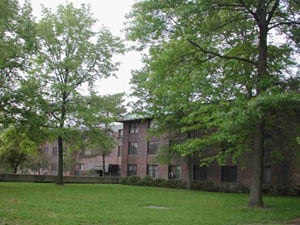
Learn the history of the building's name
Mohonk Hall is a suite-style residence hall in the Peregrine Complex, constructed in 1968. Suites in each of the Peregrine Complex halls consist of two to four double occupancy bedrooms, a common bath and a small lounge area.
Students who live in the suites enjoy the privacy of their own "living room" and can personalize it (along with their individual rooms) with posters, plants, rugs and furniture. Residents are responsible for maintaining and cleaning their own bathrooms.
Common areas feature modern furnishings and decor that provide students with a comfortable space to study or relax with friends.
In the basement of Mohonk Hall are a computer lab, laundry room with washers and dryers that are free to use for all residents, a TV lounge, cooking facilities, a bike rack and a recycling/trash room. Located on the first floor of Mohonk Hall are vending machines, a microwave oven, public restrooms and a study lounge with two computers.
Mohonk Hall is in close proximity to campus tennis and basketball courts, the Student Health Center, Peregrine Dining Hall and computer lab, the Student Union Building and Elting Gymnasium. Mohonk Hall offers its diverse residents a dynamic and high-energy environment, a friendly atmosphere that feels like home away from home, and many opportunities to get involved within the hall and campus communities.
As a 10-month hall, Mohonk is open during all scheduled vacations (unless otherwise indicated by the Director of Residence Life), allowing its resident students to remain on campus when other halls are closed. Students must already live in 10-month housing to stay over breaks.
What’s in a Building Name?
Mohonk Hall is named for Lake Mohonk, one of the “sky lakes” on the Shawangunk Ridge overlooking New Paltz. On the coast of Lake Mohonk sits Mohonk Mountain House, a 150-year-old resort owned and operated by the Smiley Family, with which SUNY New Paltz enjoys a strong and long-standing relationship.
The word “Mohonk” is believed to derive from the Delaware Indian word “Mogonck,” which was used for centuries to refer to the high hills overlooking present-day New Paltz.
From 1968-2019, the building was named DuBois Hall after Louis DuBois, an original patentee of New Paltz who settled in this region along with other original Huguenot patentees during the 17th century.
Early generations of the DuBois family, including Louis DuBois, owned enslaved Africans prior to the 1828 emancipation in New York State. W.E.B. Dubois, the American author, civil rights activist and founding director of the NAACP, traced his own lineage back to Louis DuBois.
Subsequent generations of the DuBois family demonstrated strong commitment to education and contributed to founding, governing and supporting the schools that would eventually become SUNY New Paltz.
The SUNY New Paltz College Council and the SUNY Board of Trustees voted to change the name of this and five other buildings in the Peregrine Complex in 2019, following nearly two years of research and inclusive dialogue initiated by President Donald P. Christian and led by the Diversity & Inclusion Council.
The process involved a broad constituency of students, faculty, staff, alumni, the College Council, campus leadership, and community stakeholders, including Huguenot descendants and Historic Huguenot Street leadership.
The Diversity & Inclusion Council ultimately recommended that changing the building names would position the College to better serve the needs of an increasingly diverse student population. President Christian supported this recommendation and advocated strongly for its approval by the College Council and Board of Trustees.
Consistent with our mission as an academic institution, a contemplative space will be created on campus (fall 2020) to present a more complete history of the College. That includes the history and lasting impacts of slavery, especially northern slavery, the contributions of enslaved Africans and their descendants, the history and legacy of indigenous people before and after European settlement, and the many positive contributions of Huguenot descendants to civic and educational life in New Paltz and beyond.
Read more about the building renaming process.
Complex Director: Kristopher Kremsner
Office Phone Number: (845) 257-5101
Email Address: [email protected]
Office Hours: Monday: 9am-12pm
Tuesday: 11am-4pm
Wednesday: 4pm-5pm
Thursday: 2pm-4pm
Friday: 9am-10am
RA Office: (845) 257-5100
